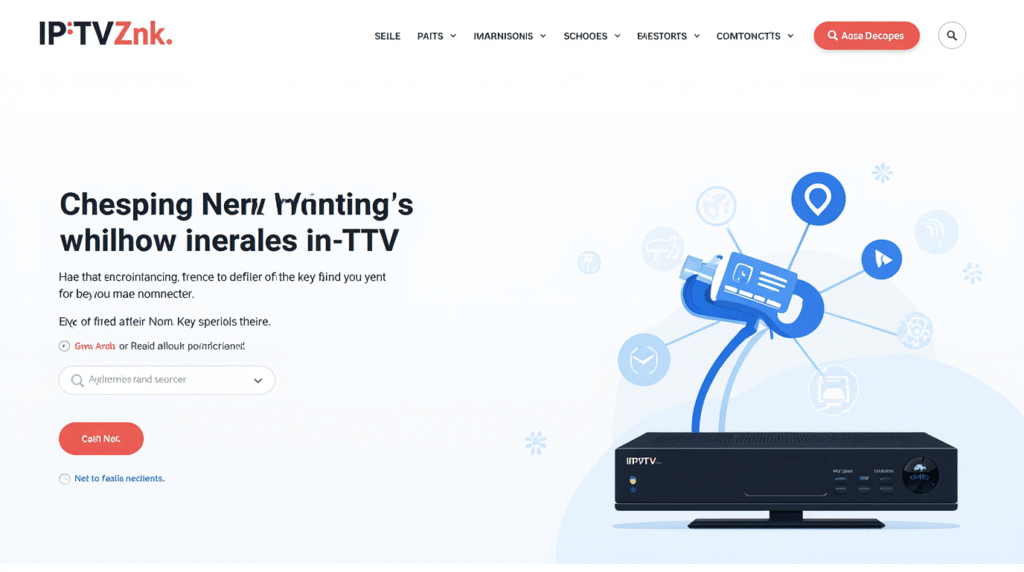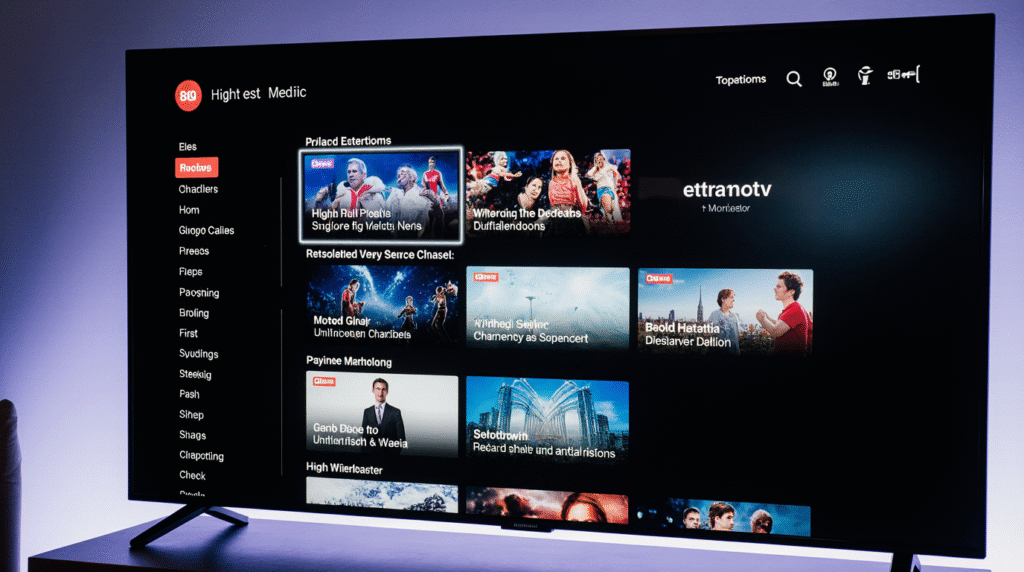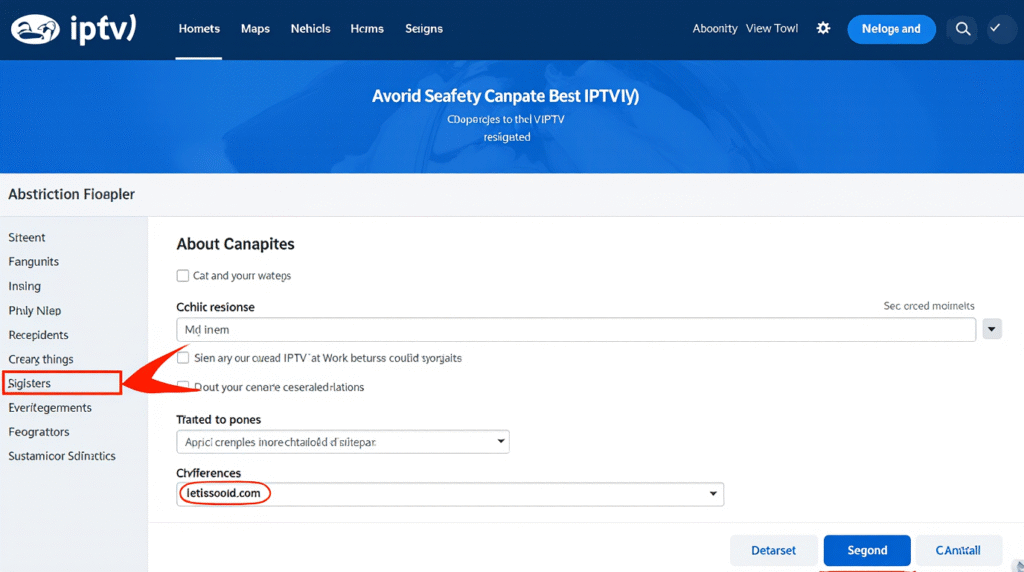Table of Contents
Introduction

The landscape of television is rapidly evolving, with more and more viewers seeking alternatives to traditional cable and satellite services. For years, consumers have been tied down by high costs, limited choices, and rigid contracts, driving a significant shift away from conventional broadcasting. Enter IPTV (Internet Protocol Television) – a revolutionary way to consume content that offers unparalleled flexibility and variety. Unlike traditional methods, IPTV delivers television programming over the internet, opening up a world of on-demand content and live channels from across the globe.
This comprehensive guide will delve into what makes an IPTV service truly stand out, helping you navigate the myriad of options to find the perfect fit for your entertainment needs. We’ll explore key features, top contenders, and essential tips to ensure you get the best IPTV experience possible, ultimately empowering you to cut the cord and embrace a more personalized viewing future.
Understanding IPTV: What is it and Why is it the Future of TV?
What is IPTV?
IPTV stands for Internet Protocol Television. In essence, it’s a system where television content is delivered using Internet Protocol (IP) networks, rather than traditional broadcast formats like cable or satellite. Instead of receiving signals through a physical cable or a dish, your TV programs are streamed to you over your internet connection, much like how you stream videos on YouTube or Netflix. The key difference from services like Netflix is that IPTV often includes live television channels, mimicking the traditional TV experience but with the flexibility of internet delivery.
How IPTV Works
At its core, IPTV operates by converting TV signals into data packets that can be transmitted over the internet. When you select a channel or a video-on-demand title, the content is sent from the IPTV provider’s servers to your device. This process relies on a stable internet connection and compatible hardware, such as a smart TV, streaming box, or computer. IPTV providers utilize robust server infrastructures and Content Delivery Networks (CDNs) to ensure efficient and high-quality delivery of streams to their subscribers, minimizing latency and buffering. For a deeper dive into how IP networks facilitate streaming, you can explore resources on Internet Protocol basics.
Benefits of IPTV
The advantages of IPTV are numerous and compelling, making it an attractive alternative for modern viewers:
- Flexibility: Watch your favorite shows and movies on virtually any internet-connected device, whether it’s your smart TV, smartphone, tablet, or laptop. You’re no longer confined to a single television set.
- Cost-Effectiveness: IPTV subscriptions are often significantly cheaper than traditional cable or satellite packages, which tend to bundle many channels you don’t watch. This can lead to substantial savings over time. For a detailed comparison of costs, consider this article on TV streaming vs. traditional cable expenses.
- Content Variety: IPTV opens up a world of content. You can access thousands of live channels, including local, national, and international broadcasts, alongside extensive Video-on-Demand (VOD) libraries featuring movies, TV shows, and series. Many services also offer niche content that caters to specific interests.
- Interactive Features: Modern IPTV services often come with advanced features like Electronic Program Guides (EPG) for easy navigation, catch-up TV to watch missed programs, and the ability to pause, rewind, or fast-forward live television.
Why consider the best IPTV service?
While the benefits of IPTV are clear, the market is saturated with options. This is why it’s crucial to consider the best IPTV service rather than simply opting for the cheapest. Quality, reliability, and the breadth of content should be paramount in your decision-making. Unreliable services can lead to frustrating experiences characterized by constant buffering, poor video quality, and even potential security risks or scams. Investing in a reputable provider ensures a smooth, enjoyable, and secure viewing experience, making your transition away from traditional TV truly worthwhile.
Key Factors to Consider When Choosing the Best IPTV Service
Selecting the ideal IPTV service requires careful consideration of several critical factors. A thorough evaluation of these aspects will help you identify a provider that aligns with your entertainment preferences and technical requirements.
Content Library and Channel Variety
The breadth and depth of content are often the primary drivers for choosing an IPTV service. Look for:
- Live TV channels: Does it offer your essential local, national, and international channels? Are sports, news, and entertainment channels well-represented?
- Video-on-Demand (VOD): Is there a robust library of movies, TV shows, and series? How frequently is new content added?
- Niche content and premium channels: If you have specific interests (e.g., foreign language channels, specialized sports, documentaries), check if they are included.
Streaming Quality
A great IPTV experience hinges on high-quality, stable streams.
- Available resolutions: Services should ideally offer content in SD, HD, Full HD (1080p), and increasingly, 4K.
- Importance of stable, high-quality streams: Consistent picture and sound without pixelation or audio drops.
- Impact of internet speed: Ensure your internet connection can support the desired streaming quality.
Reliability and Uptime
Nothing is more frustrating than buffering or service outages.
- Minimizing buffering and downtime: A reliable service should have minimal interruptions.
- Server infrastructure and capacity: Reputable providers invest in strong server networks to handle user load.
- Customer reviews and reputation: Check what existing users say about the service’s uptime and stability.
Device Compatibility
Your chosen service should work seamlessly with your preferred viewing devices.
- Supported devices: Verify compatibility with Smart TVs (Samsung, LG, Sony), Android Boxes, Firestick, Apple TV, PCs, Laptops, Smartphones (Android, iOS), and even gaming consoles. For more on choosing the right streaming device, see this guide to streaming hardware.
- Dedicated apps vs. third-party players: Some services offer their own apps, while others require third-party players like IPTV Smarters Pro or TiviMate.
Pricing and Subscription Models
Value for money is crucial.
- Monthly, quarterly, annual plans: Longer subscriptions often come with discounts.
- Trial periods and money-back guarantees: These allow you to test the service risk-free.
- Value for money: Balance the cost with the features, content, and quality offered.
Customer Support
Responsive and effective customer support can make a huge difference.
- Availability: Is support available 24/7 or only during business hours?
- Response time and effectiveness: How quickly do they respond, and are they able to resolve issues?
- Communication channels: Look for live chat, email, or a ticket system.
User Interface (UI) and Experience (UX)
An intuitive interface enhances your viewing pleasure.
- Ease of navigation: Can you easily find channels and content?
- Electronic Program Guide (EPG) functionality: A clear and functional EPG is essential for live TV.
- Search features, favorites, parental controls: These features add to convenience and safety.
Security and Privacy
Protecting your online activity is paramount.
- Data protection policies: Understand how the provider handles your personal data.
- Recommendations for VPN usage: A VPN is highly recommended for privacy and security with IPTV (more on this below).
- Avoiding services that require excessive personal information: Be cautious of providers asking for unnecessary data.
How to Identify the Best IPTV Providers for Your Needs
- Researching reviews, forums, and independent testing sites: Leverage the experiences of other users.
- Utilizing trial periods: This is the most effective way to personally test performance, content, and reliability.
- Considering your specific content preferences: Prioritize services that excel in the genres or regions you care about most.
Top Contenders for the Best IPTV Services

While specific provider names can change frequently, here’s a look at the characteristics of services that often rank among the best IPTV options, categorized by their strengths.
Service A: The Sports Fan’s Dream
This type of service is renowned for its extensive live sports coverage, offering channels from around the globe dedicated to football, basketball, racing, and more. It often includes premium sports packages that are typically very expensive through traditional providers.
- Overview: Known for its extensive channel list and robust VOD library, this service is often cited as one of the best IPTV options for sports fans due to its comprehensive coverage, including pay-per-view events.
- Pros: Wide channel selection, excellent streaming quality even during peak sports events, reliable uptime.
- Cons: Slightly higher price point, limited trial period.
- Ideal for: Dedicated sports enthusiasts, those seeking comprehensive international content.
Service B: The User-Friendly Choice
Designed with simplicity in mind, this service excels in providing an intuitive user experience, making it perfect for those new to IPTV. Its interface is clean, and setup is straightforward.
- Overview: A popular choice for its user-friendly interface and strong device compatibility, making it accessible for beginners. It often features a well-organized EPG and easy navigation.
- Pros: Excellent UI/UX, broad device support, competitive pricing.
- Cons: Some niche channels may be missing, occasional buffering during peak times.
- Ideal for: New IPTV users, those seeking simplicity and ease of access.
Service C: The Premium 4K Experience
For viewers who prioritize pristine picture quality, this service focuses on delivering a high-definition and 4K streaming experience with minimal compression artifacts. It often boasts dedicated high-bandwidth servers.
- Overview: Stands out for its exceptional 4K streaming quality and dedicated servers, providing a premium viewing experience for movies and high-fidelity content.
- Pros: Superior video quality, minimal buffering, responsive customer support.
- Cons: Higher subscription cost, fewer VOD titles compared to some competitors.
- Ideal for: Audiophiles and videophiles, users with high-speed internet connections who demand the best visual fidelity.
Service D: The Budget-Friendly Option
This type of service proves that quality doesn’t always have to come with a hefty price tag. It offers a solid selection of channels and VOD content at a very competitive rate, making it accessible to a wider audience.
- Overview: A budget-friendly option that still delivers a solid selection of channels and VOD, making it a strong contender for the best IPTV service on a tight budget. It’s a great entry point for those exploring IPTV.
- Pros: Very affordable, decent channel lineup, good for basic needs.
- Cons: Quality can vary, customer support sometimes slow.
- Ideal for: Budget-conscious users, casual viewers who don’t need every premium channel.
Service E: The Reliability Champion
Consistency is key for this service, which prides itself on stable performance and minimal downtime across various geographical regions. It’s built for viewers who cannot tolerate interruptions.
- Overview: Praised for its stability and consistent performance across various regions, with a focus on delivering a reliable streaming experience. It often has redundant servers to ensure continuous service.
- Pros: High reliability, consistent performance, good for international content.
- Cons: UI could be more modern, fewer payment options.
- Ideal for: Users prioritizing stability, those in regions with less stable internet infrastructure.
Setting Up Your Best IPTV Experience: A Step-by-Step Guide

Once you’ve chosen your best IPTV service, setting it up is a straightforward process.
Choosing Your Device
The first step is to decide which device you’ll use for viewing:
- Smart TVs: Many modern smart TVs have built-in app stores where you can download IPTV players. Alternatively, you can connect an external streaming box.
- Streaming Sticks (Firestick, Roku): These are cost-effective, portable, and popular choices for IPTV due to their ease of use and ability to sideload apps.
- Android Boxes: Offering more customization and often more powerful hardware, Android boxes are favored by users who want full control over their streaming environment.
- PCs/Laptops: You can watch IPTV directly through a web browser or by installing dedicated software like VLC Media Player or Kodi.
- Mobile Devices: For on-the-go viewing, smartphones and tablets are excellent options, typically requiring a dedicated app.
Installing the IPTV App/Player
Most IPTV services don’t provide their own app but rather integrate with third-party players. Popular choices include:
- IPTV Smarters Pro: Widely available on Android, iOS, Firestick, and Smart TVs.
- TiviMate: A highly-rated player for Android devices, known for its excellent EPG.
- VLC Media Player: A versatile media player for PCs that can play M3U playlists.
- Kodi: A powerful open-source media center that supports various IPTV add-ons.
Installation steps vary by device (e.g., sideloading on Firestick, downloading from app stores).
Adding Your Subscription
Once the player is installed, you’ll need to add your service’s subscription details:
- M3U URL: This is the most common method. Your provider will give you a unique M3U playlist URL, which you’ll paste into your IPTV player.
- Xtream Codes API: Some services provide Xtream Codes API login details (username, password, server URL), which can simplify the login process in compatible apps.
- Manual channel loading: Less common, but some players allow you to manually add individual channel URLs.
Optimizing Your Connection
A stable internet connection is paramount for a smooth IPTV experience.
- Internet speed requirements: For SD quality, 5-10 Mbps is usually sufficient. For HD, aim for 15-25 Mbps. For 4K content, 30-50+ Mbps is recommended.
- Using an Ethernet cable over Wi-Fi: A wired connection provides superior stability and speed compared to Wi-Fi, especially for high-resolution streams.
- The role of a good router: An up-to-date, capable router can significantly improve your home network’s performance.
Troubleshooting Common Issues
Even with the best IPTV setup, you might encounter occasional issues:
- Buffering:
- Check your internet speed.
- Clear the cache of your IPTV app.
- Consider using a VPN to bypass ISP throttling.
- Try connecting via Ethernet.
- Login problems: Double-check your username, password, and server URL. Contact your provider’s support if issues persist.
- Channels not loading: Verify your M3U URL or Xtream Codes details. Check the provider’s status page for server issues. Restart your device and router.
Legal Considerations and Safety Tips for IPTV
Navigating the world of IPTV also means understanding its legal landscape and taking necessary safety precautions.
Legality of IPTV
The legality of IPTV largely depends on the specific service you use and the content it provides.
- Distinguishing between legal and illegal services:
- Legal IPTV: Services like Sling TV, Hulu + Live TV, or specific international broadcasters’ apps are legal because they have proper licensing agreements for the content they offer.
- Illegal IPTV: Many “unlicensed” IPTV services re-stream copyrighted content (e.g., premium sports channels, movies still in theaters) without permission. Using such services is illegal and can carry legal repercussions in many jurisdictions.
- The importance of choosing legitimate providers: Always verify the legality of an IPTV service before subscribing to avoid potential fines or legal action. Understanding copyright laws in digital content is crucial.
The Importance of VPNs
Even with a legitimate IP TV service, a Virtual Private Network (VPN) is highly recommended for enhanced security and privacy. For more information on VPN benefits, you can refer to this comprehensive VPN guide.
- Privacy: A VPN encrypts your internet traffic, hiding your online activity from your Internet Service Provider (ISP) and other third parties. This prevents ISPs from throttling your connection based on your streaming habits.
- Security: It adds an extra layer of security, especially when using public Wi-Fi networks, protecting your data from potential snoopers.
- Bypassing Geo-restrictions: A VPN can mask your IP address, making it appear as if you are browsing from a different location. This can help you access content that might be geo-restricted in your region.
- Recommended VPN services for IP TV: Look for VPNs with fast speeds, a large server network, and a strict no-logs policy.
Avoiding Scams and Unreliable Providers
The IP TV market has its share of unscrupulous operators. Be vigilant for red flags:
- Too-good-to-be-true prices: If a service offers thousands of premium channels for an unbelievably low price, it’s likely illegal or unreliable.
- No trials or money-back guarantees: Legitimate providers are confident in their service and will often offer a trial or refund policy.
- Poor customer support: A lack of responsive support is a major warning sign.
- Anonymous payment methods: Be wary of services that only accept obscure or untraceable payment methods.
- The importance of thorough research: Always read independent reviews and check community forums before committing to a subscription.
Ensuring a Safe Best IPTV Experience
- Regularly update your IP TV apps and devices: Updates often include security patches.
- Be wary of unsolicited links or downloads: Only download apps from official sources.
- Use strong, unique passwords: Protect your account information.
Future Trends in IPTV
The IPTV landscape is dynamic and constantly evolving, promising even more sophisticated viewing experiences in the years to come.
- Integration with AI and Personalization: Expect smarter content recommendations based on your viewing history and preferences, along with predictive viewing that suggests what you might want to watch next.
- More Interactive Features: Beyond basic EPGs, future IP TV services may offer enhanced interactive elements like live polls during broadcasts, integrated chat functionalities, and multi-angle viewing options for sports or live events.
- Enhanced 4K/8K Content Delivery: As internet speeds increase and display technologies advance, higher resolution streams will become the standard, offering incredibly immersive visuals.
- Cloud-Based DVR and Catch-up TV: More sophisticated cloud-based recording and playback options will provide seamless access to missed content without the need for local storage.
The evolving landscape of the best IP TV services will continue to prioritize user experience, content accessibility, and cutting-edge technology, making TV viewing more flexible and personalized than ever before.
FAQs about the Best IPTV Services

Is IPTV legal to use?
IPTV is legal to use if the provider has proper licensing for the content they offer. However, many services illegally re-stream copyrighted content without permission. It is crucial to always verify the legality of the service you choose to avoid potential legal issues.
What internet speed do I need for IPTV?
The required internet speed depends on the quality of the stream you intend to watch. For Standard Definition (SD), 5-10 Mbps is usually sufficient. For High Definition (HD), 15-25 Mbps is recommended. For a smooth 4K experience, you should aim for 30-50+ Mbps.
Can I use IPTV on multiple devices?
Most IP TV providers offer plans that allow for multiple simultaneous connections, meaning you can watch on different devices at the same time. However, the exact number of allowed connections varies by provider and subscription plan, so always check the specific service’s terms.
How do I know if an IP TV service is reliable?
To gauge reliability, look for consistent positive user reviews on independent forums and review sites. A responsive and helpful customer support team is also a good indicator. Furthermore, a service that offers a trial period or a money-back guarantee demonstrates confidence in its reliability, allowing you to test it firsthand.
What’s the difference between IPTV and traditional cable?
The primary difference lies in how content is delivered. Traditional cable TV uses coaxial cables to transmit signals to your home, typically offering fixed channel packages. IP TV, on the other hand, delivers content over the internet, providing greater flexibility in terms of device compatibility, content selection (including VOD), and often lower costs.
Are there free IPTV services?
While some free IP TV options exist, they often come with significant drawbacks. These can include poor streaming quality, frequent buffering, limited or outdated content, and, critically, potential security risks due to unregulated sources. For a truly reliable, high-quality, and secure experience, investing in a paid, reputable service is almost always the path to the best IPTV experience.
Conclusion
We’ve explored the dynamic world of IPTV, from its core concepts and technical workings to the critical factors in choosing a service, and highlighted the characteristics of some top contenders. The journey to finding the best IPTV service is a personal one, deeply dependent on your specific needs, budget, and content preferences. It’s about more than just cutting the cord; it’s about gaining control over your entertainment.
By understanding the key considerations—such as content variety, streaming quality, reliability, device compatibility, and the importance of security—and leveraging the tips provided, you are now well-equipped to make an informed decision. Take advantage of trial periods, read reviews diligently, and prioritize a service that offers consistent reliability, exceptional quality, and the content you truly desire. Embrace the future of television with confidence, and enjoy the unparalleled flexibility and choice that the best IPTV can offer for your ultimate entertainment setup.
